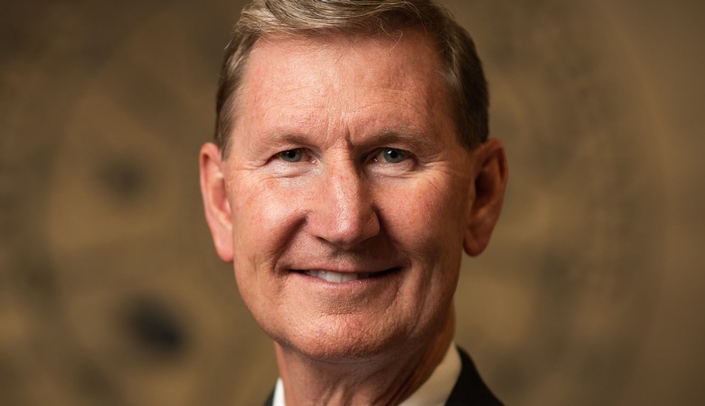Following a national search, the identification of a priority candidate, and a month-long review period that included almost 30 public events across the state, the Board of Regents is set to consider at its Dec. 5 meeting the appointment of Walter “Ted” Carter, VADM (Ret.), as the eighth president of the University of Nebraska.
Carter, 60, is the immediate past superintendent of his alma mater, the U.S. Naval Academy, and is a former president of the U.S. Naval War College. His achievements during six years as a university president, including record-high graduation rates and growth in diversity, helped earn him the unanimous support of a 23-member Presidential Search Advisory Committee that represented a range of NU constituencies. The board on Oct. 25 named him its priority candidate for president of the four-campus NU system.
If confirmed, Carter would join the university as president-elect on Dec. 16. Interim President Susan Fritz, Ph.D., would continue to provide overall leadership until Jan. 1 to ensure a smooth transition.
Board of Regents Chairman Tim Clare of Lincoln and Vice Chairman Jim Pillen of Columbus thanked the hundreds of Nebraskans who participated in the search process, whether by offering input on the qualities the next president should possess, attending an introductory event with Carter, or providing feedback on his candidacy. In all, Carter and his wife Linda traveled nearly 2,000 miles throughout the review period, visiting a dozen Nebraska communities and each university campus and meeting students, faculty, staff, alumni and friends, business leaders, farmers and ranchers, and community members.
“We are even more convinced now that Nebraskans have gotten to meet Ted and Lynda that we have found the right person to lead the University of Nebraska into its next chapter of growth and momentum,” Clare and Pillen said in a joint statement. “We’ve heard from so many Nebraskans who are impressed with his character, his commitment to students, and his record of success in academic excellence, diversity and inclusion, public and private partnerships, and so much more. These qualities make him an excellent fit for our university and state.
“We know one of Ted’s first priorities would be to spend more time with university stakeholders to get to know them better, listen to their ideas and work together to take us to even greater heights.”
Carter said: “I’m humbled that Nebraskans have given me this opportunity. The time that Lynda and I have spent learning about and touring this state has been one of our lives’ greatest privileges. When I first learned about the University of Nebraska presidency, I said it felt like my next calling. That is even more true today. If I am lucky enough to serve in this role, I would work every day to make this university the best that it can possibly be for its 51,000 students, its outstanding faculty and staff, and all the people of the state.”
Carter was superintendent of the U.S. Naval Academy in Annapolis, Maryland, from 2014 to 2019, the longest continuously serving superintendent in Annapolis. As superintendent — the Naval Academy’s equivalent of a university president — Carter led 4,400 students and 1,500 faculty and staff and oversaw a $500 million budget.
The Naval Academy’s Class of 2019 achieved a record-high graduation rate of 90%. Carter also significantly advanced diversity and inclusion there; of the Class of 2023, 28% are women and 40% are ethnic minorities, meaning white men are no longer the majority for the first time in the academy’s 173-year history.
Additionally, Carter formed the nation’s first accredited cyber operations program, and during his tenure, the Naval Academy was ranked the nation’s No. 1 public university by Forbes Magazine. In 2018, the academy enjoyed a record-high 69% winning percentage across all sports.
Carter, a Distinguished Flying Cross and Bronze Star recipient, brings extensive military service, having graduated from the Navy Fighter Weapons School (Top Gun) in Miramar, California. He was commander for the Carrier Strike Group Twelve, in which he commanded 20 ships, two nuclear-powered aircraft carriers and two carrier air wings that were deployed to Afghanistan and the Arabian Gulf. He is a naval flight officer with more than 6,300 flying hours, and has completed 2,016 carrier-arrested landings, an American record.
Carter earned his bachelor’s degree in physics and oceanography from the U.S. Naval Academy. He also has educational credentials from the 18-month-long Navy Nuclear Power School, the U.S. Air Force Air War College, the Naval War College and the Armed Forces Staff College.
Carter was raised in Burrillville, Rhode Island, a rural town with only one high school. The Carters currently reside in Suffolk, Virginia, and have two adult children.
